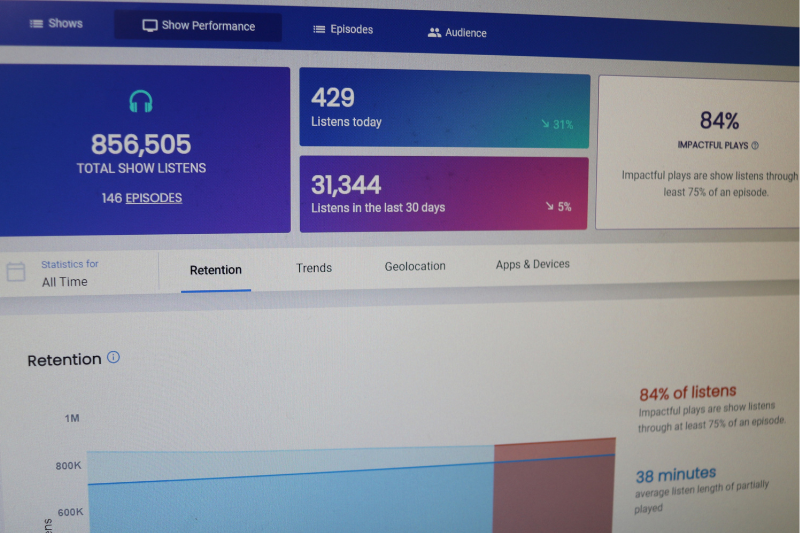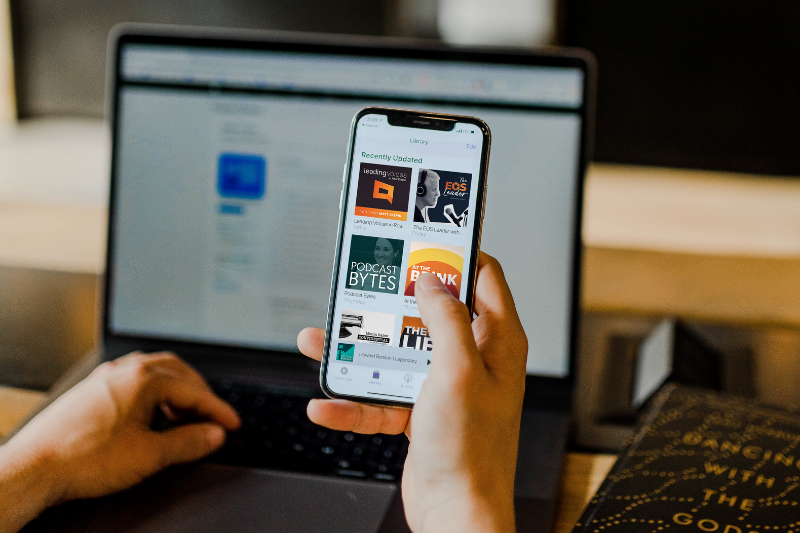Business owners, brands, and individual entrepreneurs have a comical amount of marketing choices. You have to select the most effective options from a variety of mediums, platforms, and methods, with countless nuances to each one.
You could run paid search ads, create short-form videos for TikTok, write long-form blog articles, write organic short-form content on X, launch a YouTube channel, a podcast, a newsletter… It can get overwhelming fast. Paralyzing even.
In this article, I will share some tips on choosing the right strategy for your business, and I will make a case for podcasting. And while I might be biased, I’ve been working in audio production for over 20 years, and podcasting for over 14 years. What I can tell you is that out of all the content formats out there, podcasting has an unfair advantage.
But let’s start with strategy.
How do you decide which strategy to use?
Most marketing teams pick marketing channels based on different insights. They look for the channels their ideal customers are already using, they look at trend reports to see which spaces are growing, and they look towards the competition to identify which tactics are working.
But I like to think about strategy from a different angle. You can determine where to spend your marketing resources by considering the scale of competition.
To help you understand this concept, let me share a short story.
I was driving back home from Ann Arbor to Grand Rapids, MI, on a rainy night. It was late and gloomy, and I was merging onto the Interstate after stopping at Dunkin’ Donuts for coffee when I heard something that made me stop in my cognitive tracks.
“Podcasting…is protected in this way….”
My ears perked up.
I had been listening to The James Altucher Show while driving to keep me entertained, and I was mostly focused on driving until I heard that phrase.
It’s no surprise I love podcasting, I’m a podcast producer. I know firsthand how branded company podcasts can help companies grow, and I know they have large returns on investment. But what I had heard was different, it was an angle I hadn’t considered.
On this episode, Alex Blumberg joined Altucher to discuss building his podcast company, Gimlet Media. Here is what Blumberg said (paraphrased):
“Podcasting…is protected in this way because right now, if I was launching a video service or a TV channel or a magazine… I’m competing with everything else that’s out there that people use their eyes to consume. Right? That includes video, YouTube, games, Facebook, Twitter- it’s all competing for the same time.
Podcasting exists in a different sphere. It’s the one medium that you consume while you’re doing something else, so you can do it while you’re commuting. You can do it while you’re jogging. You can do it while you’re doing the dishes or cooking. And so a lot of people use it that way. In that sense, it’s the one thing you consume on your phone, but with your phone in your pocket, it’s protected. Basically, podcasts and music are the only things competing with each other… compared to everything going after your eyeballs, there are few things going after your ears.”
I paused the episode and began to contemplate the weight of what he was saying.

Podcast analytics provided by Come Alive
Podcasting’s unfair advantage.
Podcasting is protected because it’s audio. It has a fraction of the competition compared to a visual medium because of the way they are consumed. Most of the competition wants attention from your eyes. Fewer things are going after your ears.
Marketing directors and business owners, you’re going to want to pay attention to this. Every blog post, article, case study, infographic, company video, and other visually-consumed asset is in competition with every other visually-based platform, medium, and asset out there.
Hold up. Wait a minute.
I know. You’re probably thinking something like, “Whoa. My blog post revealing our software’s latest benefits isn’t competing with entire social media networks,” or “My promotional college magazine doesn’t have New York Times bestselling books as competition.”
They are completely different mediums or genres. They aren’t in competition, right?
What if you’re wrong?
Peter Thiel discusses this idea in his book Zero to One: Notes on Startups, or How to Build the Future. Read the chapter, All Happy Companies Are Different, section, Competitive Lies.
As Thiel explains, “Entrepreneurs are always biased to understate the scale of competition, but that’s the biggest mistake a startup can make. The fatal temptation is to describe your market extremely narrowly so that you dominate it by definition.”
If you only take into account your direct competition, the battle seems easier to win. But that is not the reality of the situation. If you want to succeed, you want to beat your direct competition AND your indirect competition.
Let’s use coffee and pastries as an example. Imagine you own a food-allergy-conscious European bakery and coffeehouse.
You might think you’re only competing against only other health-centric cafés. In reality, as Thiel argues, your competition is every other breakfast place out there (yes, that includes behemoths like McDonald’s).

Podcasting is less competitive than visual marketing channels.
But what, exactly, is podcast marketing?
In simple terms, podcast marketing means promoting your brand, product, and/or services through audio content.
It can be done through various formats, with branded podcasts being the most common for businesses. When done correctly and strategically, podcasts help you tell your brand’s story and build authority through a medium that is conversational and intimate.
So, how can you use podcasting to your advantage?
Where would you rather compete for attention? On visual mediums with EVERYONE else. Or would you rather own a space with fewer competitors?
Podcasts have roughly four competitors:
- Radio
- Music
- Audiobooks
- Other podcasts
At the same time, a well-produced branded podcast can help you:
- Establish authority in your industry.
- Generating new leads and sales.
- Network and build trust.
- Educate and reach prospects, clients, and teams.
- Influence large groups of people.
In other words, it can help you accomplish a lot of the same goals as visually-focused
content formats. But wouldn’t it be better to market in a space with four primary competitors instead of tens of thousands of competitors?
I’m not suggesting you should abandon all visually-based content. In fact, podcasting should be part of an omnichannel marketing strategy. However, if your goals include any of the ones mentioned above, then audio marketing will give you a great advantage over your competitors.
And if you are interested in working with an experienced team of podcasting experts to bring your branded podcast to life, you can schedule a discovery session with us anytime.


